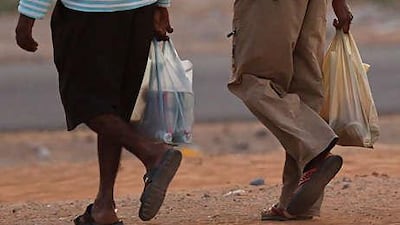ABU DHABI // Alcohol laced with a concoction of drugs or chemicals is being smuggled into camps, putting labourers' lives at risk, experts say. Gangs are cutting corners and thinning batches of alcohol with easily obtained but deadly additions such as valium or vehicle coolant, according to doctors on the front line.
And smuggling illegal alcohol can bring violence with it: in Dubai this week, two Syrian men were charged with attacking a police officer who was trying to arrest them on suspicion of trucking thousands of bottles of alcohol to Saudi Arabia. Dr Ashraf El Houfi, head of the intensive care unit at Dubai Hospital, said: "We see a couple of fatalities [from poisoning] every few months. We only see the cases that are severe enough to come to the intensive care unit, but there will be many more we don't get."
Construction workers who cannot afford the prices of alcohol sold in liquor shops often buy from illegal vendors who sell locally manufactured batches, which could contain lethal ingredients, officials say. "The most common fake alcohol is the radiator coolant for the cars - it's cheap and has a strong alcohol content, but it is very dangerous," Dr El Houfi said. Ethylene glycol, the compound used to make antifreeze, is common as an alcohol substitute. One bottle of the liquid can cost as little as Dh15 in most garages. It has a sweet taste but turns toxic once ingested. It damages the central nervous system first, Dr El Houfi said, followed by the heart and kidneys.
By the time patients arrive at the ICU, their condition is usually "advanced", and even the poison control centres cannot offer solutions. "It is severe intoxication, basically poisoning," Dr El Houfi said. "Often we don't have exact information, because the people who drop them off are worried about getting in trouble with the police for consuming alcohol, so they run off." Methyl alcohol, or methanol, is another common ingredient in illegal batches of alcohol, he said, and if consumed even in small amounts over a period of time can cause blindness. Less than 125ml of methanol can be fatal to humans.
"It's obvious that none of these things should be drunk, but are people aware of the damage they do? Probably not," said Dr El Houfi. "Maybe if we explained all this to the people drinking them, we wouldn't see the fatalities." Dr Bilal Hashim, who works at the Jebel Ali Corporate Clinic in Dubai, said he has come across two cases of poisoning so far this year. But he added that if a patient arrives at his ICU with symptoms of alcohol poisoning he has to notify the police and send the patient to a government hospital.
"They will put different materials in [the alcohol] and are maybe putting types of medication such as valium in it," he said. The valium is smuggled from outside the UAE, according to Dr Hashim. "They crush it into a powder. We don't know the how much is going into it and there are no studies or reports on it either," he said. "Each case is different but what we do know is, what has been drunk is not real alcohol," Dr Hashim said.
Charles Mallice, director of operations at ADSECC, a firm that provides security at several labour camps in Abu Dhabi, said organised criminal gangs are the biggest source of alcohol on the sites. Sometimes the alcohol has been tampered with, but in most cases it is cheap alcohol that has been smuggled in. "[Criminals] are delivering it; they are forcing people to deliver it and they are making money out of it," he said.
He said workers are smuggling the alcohol into the camps in plastic bottles hidden under their clothing or in taxis. "We've had finds of up to a 1,000 bottles at a time. We are strict on it in a lot of the camps and push it to other camps, but I'd say [the discovery of alcohol stashes are] a weekly thing. It used to be a lot more. The numbers have come down and we have sting operations where they'll actually go out and set up these people, grab them and hand them over to the police," Mr Mallice added.
He added that he was aware that some people are "bootlegging" alcohol, but not in the labour camps. "You wouldn't want to drink it. It would drive you blind. They put in ethanol as a sweetener," he said. In the past, there have been cases of workers stumbling across a stash of illicit alcohol near a labour camp. "He gets beaten up with a crowbar," Mr Mallice said. A spokesman for the Valley of Love, a social organisation that helps labourers in distress, said the situation would be better controlled if workers were allowed to drink legally.
"Anybody who might want a tipple, but it is not available, will do anything to get it. So if it means finding it underground in illegal ways, they'll do it," he said. "If they go underground, there is no legislation, and if something happens, who do you go to?" Most labourers make Dh800 to Dh1,000 per month, but the minimum salary required to obtain an license to buy and consume alcohol is Dh3,000. "We would like to say this should not be limited to a particular bracket. They should be allowed to have it at a legal outlet where they can buy it legally."
eharnan@thenational.ae

